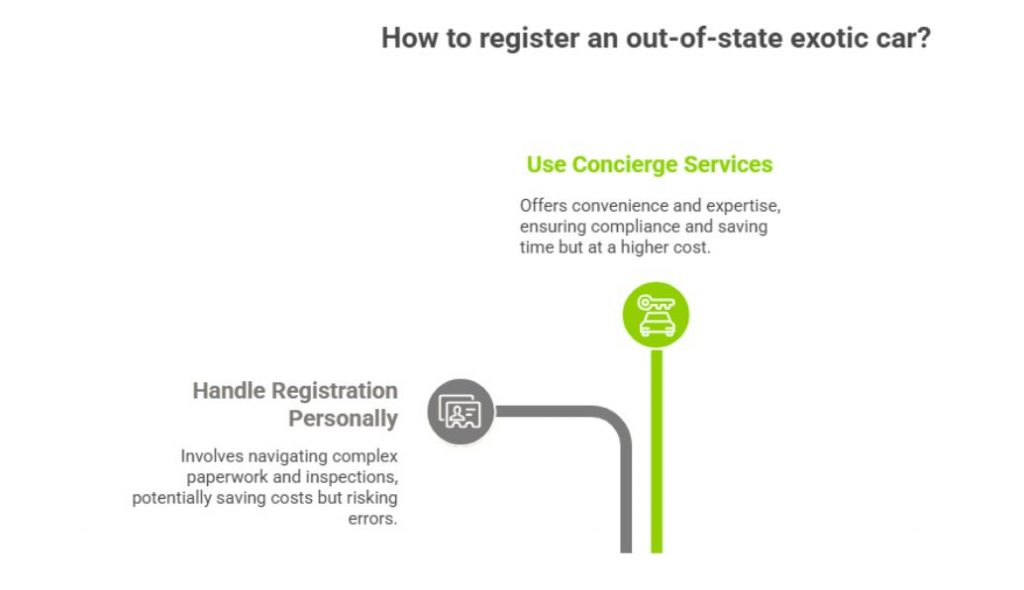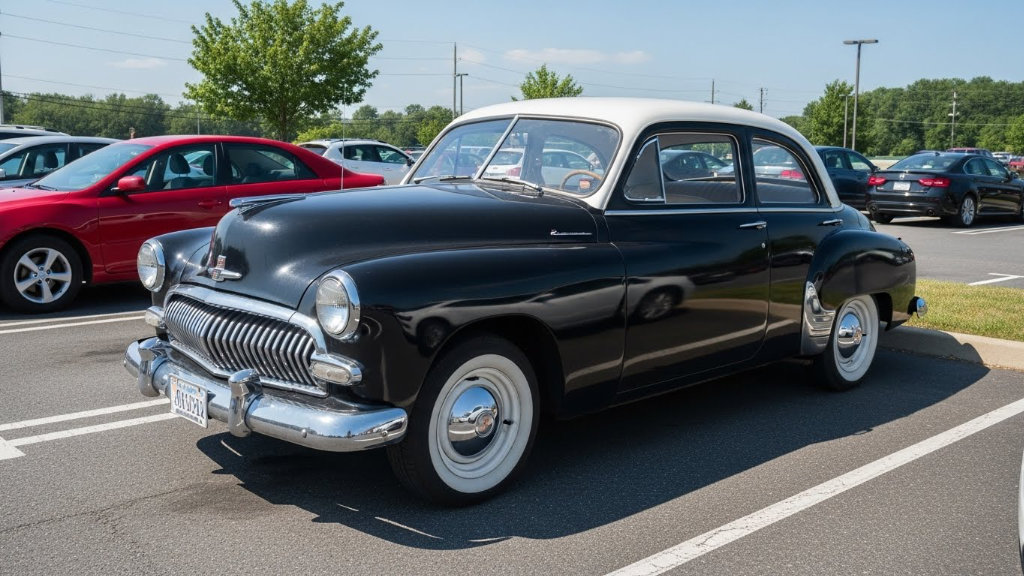Owning an exotic car is about more than transportation—it’s about freedom, prestige, and the satisfaction of knowing your investment is secure. But when that car comes from out of state, registration becomes the first test of ownership. For most drivers, the process is filled with paperwork, inspections, and unexpected costs. For exotic owners, the stakes are higher: six- and seven-figure assets, unique compliance requirements, and taxes that can easily add up to tens of thousands.
That’s where Ride Legal makes the difference. Instead of spending weeks navigating state rules, exotic owners choose us for:
Significant tax savings through proven strategies like Montana registration.
Streamlined registration with no inspections in most cases.
Concierge-level service and 24-hour customer support.
Asset management structures that protect and maximize the value of high-end vehicles.
You could handle the process on your own. We’ll walk you through every step so you understand what’s required. But most of our clients realize quickly that it’s far more efficient, cost-effective, and secure to have our experts manage the process from start to finish.
Exotic Car Registration Steps
| Step | What It Is | Why It Matters |
|---|---|---|
| 1.1 Obtain Proper Documentation | Collect the title, bill of sale, and supporting ownership papers. | These documents prove ownership. Any errors or missing details can stop the process—precision is critical for high-value vehicles. |
| 1.2 Emissions & Safety Inspections | Some states require proof of compliance with emissions and safety laws. | Exotics with modifications or imported specs may face extra scrutiny; exemptions exist in some jurisdictions. |
| 1.3 VIN Verification | Confirm the Vehicle Identification Number matches the paperwork. | Prevents fraud, theft, or title-washing. Older and imported exotics may need additional proof of authenticity. |
| 1.4 Insurance Requirements | Provide valid insurance from your registering state. | Exotics often require specialized coverage; premiums and appraisals are frequently higher than standard vehicles. |
| 1.5 Sales Tax & Fees | Pay sales tax, registration charges, and any applicable surcharges. | Totals can reach tens of thousands; each state calculates differently, so advance research is essential. |
| 1.6 Concierge Services (Ride Legal) | Ride Legal manages paperwork, inspections, VIN checks, and compliance end-to-end. | Saves time, reduces errors, maximizes savings, and provides dedicated asset management with 24-hour support. |
| 1.7 Temporary Tags or Transport Permits | Secure short-term permits for moving the car before full registration. | Prevents fines or impoundment when transporting across state lines. |
| 1.8 Final Registration | Submit all documents to the state agency to receive plates and title. | Officially recognizes your exotic for road use under your home state’s laws. |

1. The General Process for Registering an Out-of-State Exotic Car
1.1 Obtain Proper Documentation
Before you even think about driving across state lines, make sure the paperwork is airtight. The title and bill of sale are the foundation of your ownership. These documents establish that the car belongs to you and form the basis of your new state registration. If either is missing, inconsistent, or improperly completed, the DMV will halt your application before it begins. For exotic cars, where six- or seven-figure values are at play, precision matters even more.
1.2 Emissions and Safety Inspections
Most states won’t simply take the car at face value—they’ll require proof it complies with their emissions standards and safety regulations. Exotic vehicles can add layers of complexity here, especially if they’ve been modified with aftermarket exhausts, tuned engines, or imported parts. Some jurisdictions offer exemptions for collector or limited-use vehicles, but others impose rigorous inspections that can delay registration until every requirement is met.
1.3 VIN Verification
A Vehicle Identification Number (VIN) verification ensures the exotic car in your driveway matches the paperwork in your hand. This step helps prevent fraud, theft, and title-washing. Verification is usually conducted at a DMV office, law enforcement station, or an authorized inspection site. For unique imports or older exotics, special scrutiny is common—don’t be surprised if extra documentation is required to confirm authenticity.
1.4 Insurance Requirements
No registration moves forward without proof of insurance in your registering state. Exotic cars often demand specialized coverage beyond standard policies. Premiums can be steep, and some insurers require appraisals or usage limitations. Securing coverage in advance avoids the dreaded DMV counter shuffle when you realize your out-of-state policy doesn’t qualify.
1.5 Sales Tax and Fees
Brace yourself: registering an exotic car can come with a serious tax bill. Most states calculate sales tax based on the vehicle’s purchase price or fair market value, which for exotic cars can mean tens of thousands of dollars. Add in title transfer fees, registration charges, and potential luxury surcharges, and the final tally is rarely small. Each state handles these differently, so researching local laws ahead of time is critical.
1.6 Concierge Services Through Ride Legal
For many exotic car owners, the most efficient move is to skip the DMV line altogether and lean on Ride Legal’s concierge registration services. These services handle the paperwork, coordinate inspections, verify VINs, and manage state-specific compliance from start to finish. By using these concierge services, owners not only save time but also avoid the risk of costly mistakes in complex, high-value transactions. Ride Legal acts as a dedicated partner, ensuring your exotic is registered correctly, compliant, and with minimal hassle.
1.7 Temporary Tags or Transport Permits
If you’re transporting the car yourself, you’ll need temporary tags or transit permits. These short-term credentials make it permitted to drive your exotic car from the seller’s state to yours while you complete the registration process. Skipping this step risks fines or even impoundment—a nightmare scenario for any car enthusiast.
1.8 Registration at the DMV (or Equivalent Agency)
Finally, the culmination of your efforts: a trip to the DMV—or, if you’ve engaged Ride Legal, this step may already be handled for you. With all documents in order—title, bill of sale, inspection reports, VIN verification, insurance proof, and proof of tax payment—the DMV issues your new plates and state title. It’s the official moment when your exotic car becomes recognized for road use in your home state.
Pro Tips for Avoiding Delays and Saving Money
1.9 Strategic Insights and Tips
Researching State-Specific Exemptions and Deadlines
Every state has its quirks, and exotic car owners ignore them at their peril. Some states offer exemptions for collector vehicles or limited-use registrations that can spare you from emissions testing. Others enforce tight registration deadlines—in Florida, for example, new residents have just 10 days to register an out-of-state car. Knowing these rules ahead of time can mean the difference between a smooth process and costly penalties. Whether you’re preparing for Montana vehicle registration or filing through another state’s DMV, planning ahead is essential.
Planning for Tax and Fee Obligations
Sticker shock doesn’t end at the purchase price. Sales tax, luxury surcharges, and recurring fees can quickly add up, especially for cars worth six or seven figures. Mapping out these expenses early helps avoid surprises. For serious collectors or repeat buyers, it’s worth consulting resources like the National Automobile Dealers Association (NADA) for tax and valuation guidance. Many buyers choose Montana LLC car registration to reduce or eliminate sales tax exposure.
Avoiding Delays and Other Issues
Nothing stalls the thrill of ownership like bureaucratic hiccups. Missing paperwork, failed inspections, or expired temporary tags can lead to fines—or worse, an unusable car sitting idle in your garage. Stay organized: keep copies of every document, verify VIN details twice, and schedule inspections as early as possible. If you’re pursuing Montana LLC vehicle registration or Montana motorcycle registration, working with a professional service ensures you won’t miss critical steps that could delay your plates.
Considering Tax-Advantage States Like Montana
For those seeking smarter strategies, Montana remains a powerful option. Registering through an LLC in Montana can eliminate sales tax and significantly reduce costs. Montana LLC registration also opens the door to services like Montana trailer registration, Montana LLC RV registration, or even Montana LLC for RV registration, depending on the type of vehicle. However, this approach comes with caveats. Some states aggressively pursue residents who use Montana registrations to sidestep local laws. Before pursuing this path, weigh the potential savings against the risk of scrutiny. Using a service like Dirt Legal ensures your Montana LLC trailer registration or DMV trailer registration process is fully compliant and hassle-free. For background, review the IRS guide on motor vehicle use tax and registration considerations.
2. Specific Considerations
2.1 Montana
When it comes to registering exotic cars, Montana is the state that turns heads—and not just because of its wide-open highways. Montana has no statewide sales tax, making it a magnet for exotic and high-value car owners looking to avoid hefty tax bills elsewhere.
The strategy often involves forming a Montana Limited Liability Company (LLC), through which the exotic car is purchased and registered. The LLC, rather than the individual, becomes the registered owner, allowing the vehicle to benefit from Montana’s tax-friendly laws. This can translate into five- or six-figure savings on some purchases.
That said, the approach isn’t without complexity. This is where Ride Legal concierge services add real value: they handle LLC formation, ensure compliance with state rules, and keep the process airtight from start to finish.
3. Special Scenarios
3.1 Importing Exotic Cars
Bringing in an exotic car from abroad adds an entirely new layer of bureaucracy. Vehicles must comply with U.S. Customs and Border Protection (CBP) regulations, Environmental Protection Agency (EPA) emissions rules, and Department of Transportation (DOT) safety standards.
The paperwork can be extensive—customs declarations, proof of foreign title, and compliance letters are just the beginning. Many exotic imports also require modifications to meet U.S. safety or emissions criteria, which can significantly delay registration. The result: registering an imported exotic often demands more patience, money, and professional guidance than buying domestically.
3.2 Modified and Custom-Built Cars
Exotic cars are rarely left stock for long. But heavily modified or custom-built cars can trigger special inspection requirements. States may demand enhanced safety checks, emissions tests, or even third-party evaluations before granting plates.
The risks are real: if a car fails inspection, registration may be denied until costly repairs or modifications bring it back into compliance. For exotic owners, this can mean navigating a frustrating cycle of testing, fixing, and retesting—especially in states with little tolerance for non-factory builds.
3.3 Using Professional Registration Services
Given the complexity, many owners turn to professional out-of-state registration services. These companies specialize in navigating the labyrinth of paperwork, inspections, and tax rules that come with exotic cars.
The advantages are significant: they can save time, reduce errors, and streamline compliance, particularly for exotic imports or vehicles with extensive modifications. For high-value cars, where the stakes are enormous, leveraging expert services can mean the difference between a seamless registration with tax savings, asset protection, and concierge support—or costly delays that keep your car off the road.

FAQ: Registering Exotic Cars Across State Lines
What state has the most registered supercars?
Florida and California consistently top the charts for the number of registered supercars. Warm weather, affluent communities, and vibrant car cultures make them prime hotspots. California boasts the largest exotic car population overall, while Florida’s luxury enclaves like Miami and Palm Beach are magnets for supercar collectors.
Why are supercars registered in Montana?
Montana has no statewide sales tax, which can save exotic car owners tens of thousands of dollars on vehicles worth six or seven figures. By forming a Montana LLC, owners can register their exotic cars under the company, bypassing local taxes in their home states. This is why Montana plates are a common sight on Ferraris, Lamborghinis, and McLarens across the country. Ride Legal concierge services specialize in managing this process safely and in compliance with state rules.
Do Montana plates comply with other state laws?
Yes. Montana plates registered under a Montana LLC are fully compliant. The vehicle is properly registered in the state where its owner (The Montana LLC) resides.
Transfer Rule Exemptions
– Many states have laws requiring out-of-state plates to be transferred within 30 days, but these rules don’t apply to Montana LLCs. Your motorcycle’s legal “home” is in Montana, even if you live elsewhere.
– Remember that your LLC owns the vehicle, and can permit anyone to operate it regardless of where their driver’s license is issued.Law Enforcement: Law enforcement officers cannot stop or fine your LLC simply for having Montana plates unless there’s a clear traffic violation.
What state has the least expensive car registration?
With the help of Ride Legal, vehicle owners can take advantage of Montana, one of the cheapest states for registration fees. In contrast, states like California and New York often impose steep surcharges or luxury taxes on exotic and high-value cars. Choosing a low-cost state for registration can reduce annual ownership costs dramatically — but only when handled with proper documentation and compliance support from Ride Legal.
How much does it cost to register a Lamborghini in the U.S.?
The cost varies widely by state. In California, registration fees, taxes, and surcharges on a Lamborghini can exceed $20,000–$30,000. In Montana, registering through an LLC could cost only a fraction of that, since there’s no sales tax. The difference in total expense can be staggering, which is why location—and the strategy you choose—matters so much.
Can I register an exotic car in a different state than where I live?
Yes, but it depends on the state’s laws and your personal circumstances. Montana allows vehicles to be registered under an LLC regardless of where you reside, which is why it’s so popular among exotic car owners. However, some states actively monitor residents who drive cars with out-of-state plates to ensure compliance with local tax laws. Using Ride Legal ensures that your registration strategy is both compliant and optimized for your specific situation.
Why Register Your Vehicle in Montana?
Registering an exotic car purchased out of state isn’t impossible—it’s a process. It requires meticulous attention to documents, inspections, insurance, and the inevitable taxes and fees. State laws differ dramatically, and what works in Montana may fall flat in California or Florida.
The key is preparation. By researching local requirements, planning for tax obligations, and seeking professional guidance when needed, you can streamline the experience and avoid pitfalls. And for those open to alternative strategies, tax-friendly states like Montana offer powerful opportunities to save.
At the end of the day, the goal is simple: transform the paperwork into plates so you can enjoy the car the way it was meant to be enjoyed—on the open road.
With Ride Legal concierge services, your exotic car registration is handled from start to finish—saving you time, money, and hassle, so you can focus on driving.



